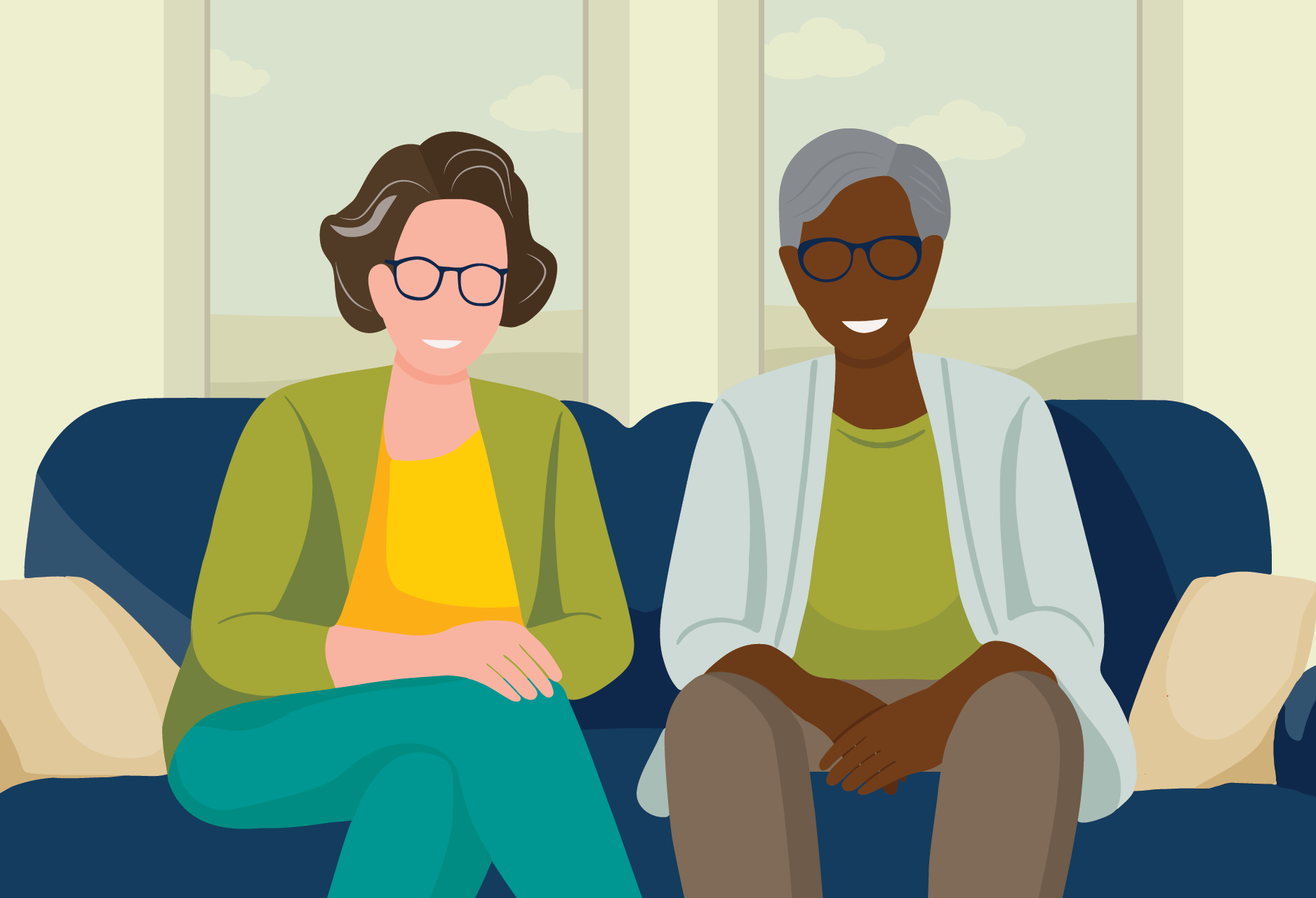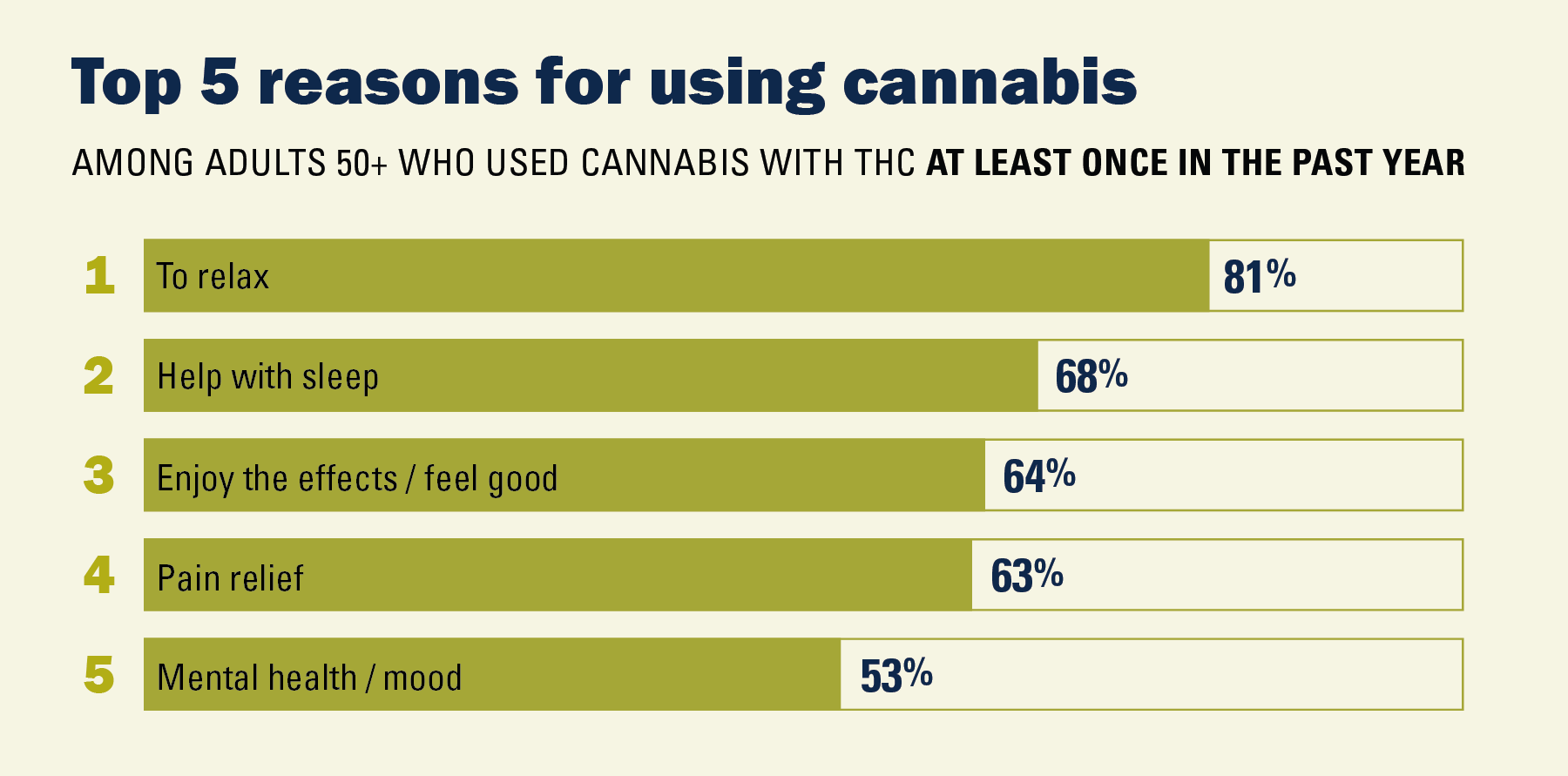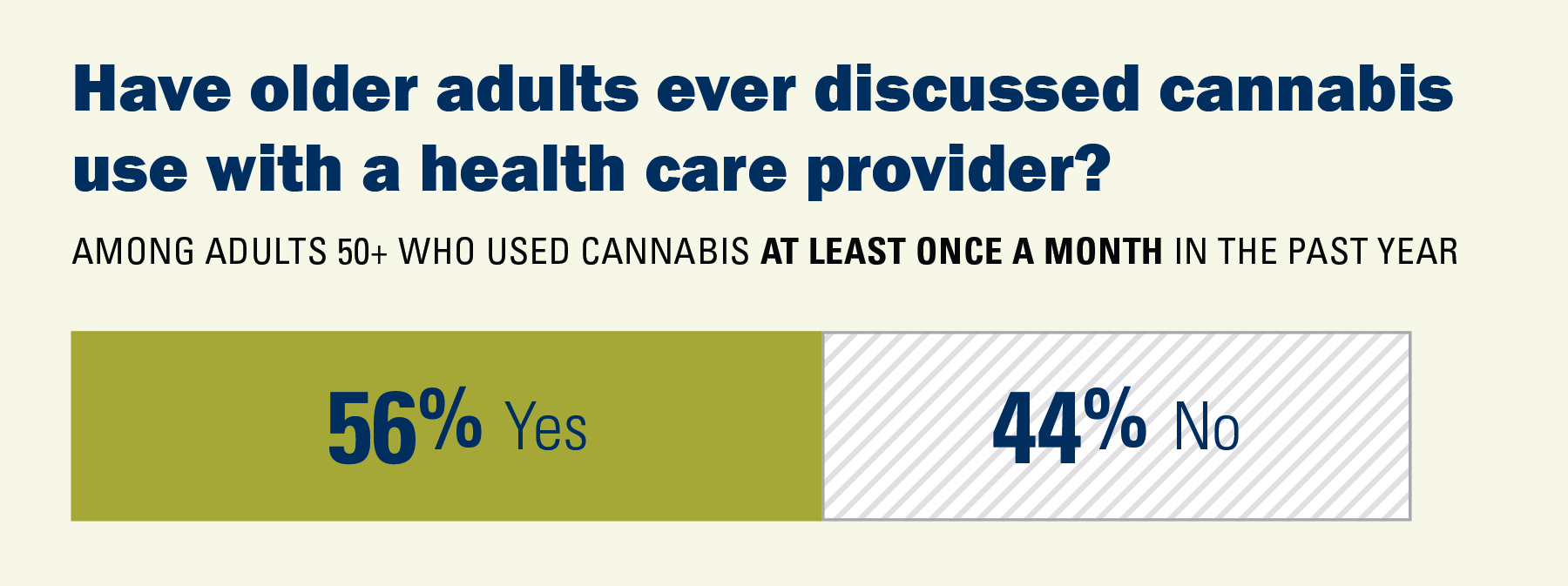
National Key Findings
The top five reasons older adults use cannabis (excluding CBD-only products) are to:
Relax
Help with sleep
Enjoy the effects / feel good
Help with pain relief
Help mental health or mood
Among adults age 50 and over, 12% used cannabis at least once a month in the past year.
Among older adults who used cannabis monthly, 56% have discussed cannabis use with their health care providers, while 44% have not.
Over half of U.S. states have legalized cannabis (marijuana) for recreational and / or medical use. Cannabis products that contain THC (delta-9 tetrahydrocannabinol) are psychoactive, meaning they can create a feeling of being “high” and be addictive. These are different than CBD products (often sold in pharmacies or grocery stores) that contain very small amounts of THC.
To understand older adults’ perspectives on and experiences with cannabis, in February and March 2024 the University of Michigan National Poll on Healthy Aging asked a national sample of adults age 50 and older about their cannabis use, reasons for using, risky behaviors, and whether they discussed use with health care providers.
Who uses cannabis and how often
In the past year, 21% of adults age 50 and older used cannabis (like flower, vapes, edibles, dabs): 9% once or twice and 12% at least once a month. Conversely, 79% of people age 50 and older said they never used cannabis in the past year.
Older adults in fair / poor physical health, those age 50–64, and those with household incomes under $60,000 were more likely to use cannabis than older adults in better physical health, those age 65 and over, and those with household incomes of $60,000 or more, respectively.
Why older adults use cannabis
Among those who said they used cannabis in the past year, their top five reasons for using were to relax (81%), help with sleep (68%), enjoy the effects / feel good (64%), help with pain relief (63%), and help mental health or mood (53%).
Some also used cannabis to attempt to treat a medical condition (40%), make a social gathering more fun / connect with others (31%), celebrate (26%), or experiment (18%).

Types of cannabis products used
Among adults age 50 and older who used cannabis, the products most commonly used were edibles / beverages (74%) and flower (58%). Fewer people used lotions / skincare products (34%); vaporizers (vapes) (26%); and dabs, butane hash oil, or other concentrates (19%).
Concerns and high-risk behaviors
Most people age 50 and older agreed that cannabis is stronger today than it was 20 or 30 years ago (79%), and that people can become addicted (72%).
Among older adults who used cannabis at least once a month, some reported signs or behaviors in the past year that may indicate dependence:
- 22% used more cannabis to feel the effect they wanted
- 21% found that using the same amount had less effect than it used to
- 17% increased their use (either amount or how often)
- 13% had strong desires or cravings
Also, 20% of older adults who used cannabis in the past year said they drove within two hours of use at least once. This percentage was higher (27%) for those who used cannabis at least monthly.
Discussing cannabis use with health care providers
Among older adults who used cannabis at least once a month, 56% have discussed cannabis use with their health care providers; 43% brought up the topic themselves, 10% said the provider did, and 3% said both they and their provider raised the topic of cannabis.

Implications
Our poll found that 21% of people age 50 and older used cannabis with THC at least one time in the past year, and 12% did so at least once a month. Cannabis use is linked to health risks that can include addiction, impaired driving, and reduced brain functions (e.g., slower coordination, memory problems). Use of cannabis can also complicate other health conditions, and regular use may contribute to higher risk for these negative outcomes. We also learned that older adults consume many different forms of cannabis with varying health risks. Smoking and vaping can damage lung health, whereas edibles and dabs, which are higher in THC, can cause acute medical problems (e.g., psychosis, seizure-like shaking).
While the most common reason older adults used cannabis was for relaxation, nearly as many used it to try to help their sleep and / or mental health. Research shows that using cannabis to cope with depression, anxiety, and other mental health conditions is linked to worse outcomes, like becoming dependent on (i.e., addicted to) cannabis. To address relaxation, sleep, and mental health, older adults can consult health care providers, including mental health professionals, to explore treatments for these concerns that are effective and safer than cannabis.
Some older adults hold misconceptions about cannabis. While cannabis is addictive, 28% of older adults in our poll did not think so. In fact, our poll found that many adults age 50 and older who used cannabis regularly experienced key signs of cannabis dependence, like tolerance or strong cravings. Moreover, some older adults think cannabis is not stronger today than it was 20 or 30 years ago. However, the strength of cannabis has grown dramatically since the 1990s. As a result, people who return to cannabis use after years of not using it may have a different reaction than they did before. The strength of today’s cannabis can also lead to increased risks while driving, so individuals should avoid driving after using cannabis.
For Older Adults and Their Families
It’s understandable that some people age 50 and older are curious about cannabis and may want to learn about or experience it. It’s also important to know the risks. Everyone should be aware that there is no safe medical guideline or recommended dosage for cannabis products. In most places it is also illegal to drive after using cannabis. Cannabis stays in the body long after the high is gone, so even if a person has not used cannabis in several days or weeks, they could still have a positive cannabis result if tested during a driving violation. This could affect driving privileges and / or have legal consequences, even when cannabis is being used for pain relief or other physical / medical reasons.
For Health Care Providers
Providers should be aware that many patients age 50 and older are now using cannabis, including through high potency methods like vaping and dabbing, but many older adults are not necessarily talking about their use with a health care provider. Asking patients about cannabis use can help identify related health risks like impaired driving, coordination problems that could increase falls, and / or dependence. Providers can also ask about the use of all medications, supplements, and other substances at each visit so that they can help manage medication interactions and address potential problems before they worsen. Moreover, clinical screenings can be used to inquire about the use of THC-based products to identify potential cannabis dependence and offer treatment.
For Policymakers
Policymakers should be aware that cannabis is not a benign substance free of risk, and that public health approaches are warranted to lessen negative impacts while also supporting further research into the potential therapeutic effects of cannabis. Guidelines for safer use of cannabis may need to be tailored for older adults and for specific health concerns. There have been recent efforts to change the federal cannabis scheduling and decriminalize its use which could have important implications for law, public health, and research.
For Community and Social Service Organizations
Many older adults are looking for ways to relax, deal with pain, and / or address mental health symptoms or loneliness. Comprehensive solutions to these issues are necessary to support health and well-being. Although cannabis may offer promise to some individuals, other services like counseling or psychotherapy and programs that foster social connection may be more effective and pose fewer health risks.
Data Source and Methods
This National Poll on Healthy Aging report presents findings from a national household survey conducted exclusively by NORC at the University of Chicago for the University of Michigan’s Institute for Healthcare Policy and Innovation. This survey module was administered online and by phone from February 22nd–March 12th, 2024 to a randomly selected, stratified group of U.S. adults age 50–101 (n=3,379), with an oversample of non-Hispanic Black and Hispanic populations. The survey completion rate was 44% among panel members invited to participate. The margin of error is +/– 1 to 4 percentage points for questions asked of the full sample and higher among subgroups.
Findings from the National Poll on Healthy Aging do not represent the opinions of the University of Michigan. The University of Michigan reserves all rights over this material.
Citation
Bonar EE, Strunk S, Singer D, Box N, Solway E, Roberts S, Malani P, Smith E, & Kullgren J. How Older Adults Use, Think About, and Discuss Cannabis. University of Michigan National Poll on Healthy Aging. September 2024. Available at https://dx.doi.org/10.7302/24238